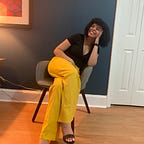Social Unrest Leads to Mental Unrest
Checking in on Your Mental Health During the Black Lives Movement
Korey Michelle was looking for her favorite plant-based meat in Walmart when she made eye contact with a white woman. Michelle froze when she leaned in and whispered, “I support you.” Not wanting to be rude, she mumbled, “thank you,” walking away without grabbing her meat.
Michelle, retired military, has had this experience more than once this year. “Being black in public has caused more people to come up to me,” says Michelle. “They really want me to know their stance. The interactions have aggravated and made me a little scared.”
The Black Lives Matter movement has called people to act across the world. Stories about how to talk to racists are reposted on the internet so often, you may see them twice. If it’s not on racism, it could be how to stay physically safe during a protest. Mental health like physical health should be of equal concern for young activists.
Nina Zamora, 19, leads the Guerrilla Protest group in South Florida. She so far has held three protests in Pembroke Pines and Miami Lakes. Guerrilla Protests gatherings have all been peaceful so far says, Zamora.
A peaceful protest, like Zamora’s, is not uncommon. Often the group may get some hecklers, but physical violence hasn’t been pursued. On the news, the violent protests are usually shown over the peaceful ones as a Washington Post puts it, “Mayhem is news.”
This violence is seen by many young black adults in America, like senior college student Dwain Coleman. Coleman says every time something violent happens his mom tells him to watch the news with her.
Coleman says he does try to take breaks from the news calling it, “Exhausting, you just keep seeing people of power killing us.”
If an activist does get hurt at a protest or is attacked because of their race, it could cause PTSD.
Dr. Isha Metzger, a licensed clinical psychologist and assistant professor at the University of Georgia, says if young people do experience symptoms of PTSD, “Most people heal and recover from these stressful experiences with support from their friends, families, and communities.”
With the movement, many black activists are coming face to face with people who have quite different opinions about the movement which may result in racial trauma. Coleman says, “I was maybe 13 years old when I first experienced racism.” According to the University of Georgia, 60 percent of Black Americans have personally experienced one incident of racial discrimination in their lifetime.
Social media was once an escape from the news and other stressors. Where friends shared their laughs, but for many, it doesn’t help either.
“It’s like you almost always looking for it. Oh, what the hell happened? Then you have to read it. Then get frustrated with all the comments,” Coleman says about social media. “Then you have to go to Twitter to see what’s trending. Then you do some research which sends me down a dark hole. I’ll watch YouTube or a butterfly documentary.”
Metzger says that unplugging all together and setting boundaries for yourself are some of the best ways to cope. “The news is responsible for reporting local and national information,” Metzger says. “Establishing healthy routines, having transformative conversations and focusing on things that you can control like voting could benefit the youth and empower them.”
Zamora advocates for conversations instead of arguments during her gatherings. “They don’t understand us,” Zamora says about racists or not like-minded people. “We have to find a middle ground in order to have an open dialogue. Arguing doesn’t solve anything.”
Coleman, too, tries his best to have conversations with people who don’t have a like-minded opinion of black lives. Most of Coleman’s conversations are on social media platforms like Instagram.
Coleman creates a situation, “Your mom says you’re doing the dishes wrong, but you think you’re doing the dishes right.” He laughs. “They (racists) are stuck in their mind of how things should work. You can say don’t do that and scream at them. Stop. They’re not going to listen, just like you aren’t going to listen to your mom.”
While fighting for equality, activists need to learn how everything can affect their mental health. Stepping back and finding a healthy way to cope with change and animosity is important. To make a change, it should start with the individual taking care of themselves and, more importantly, their mind. Finding those that are struggling with the same things can help each individual. Metzger recommends participating in prayer or in meditation to help get through rough times.
